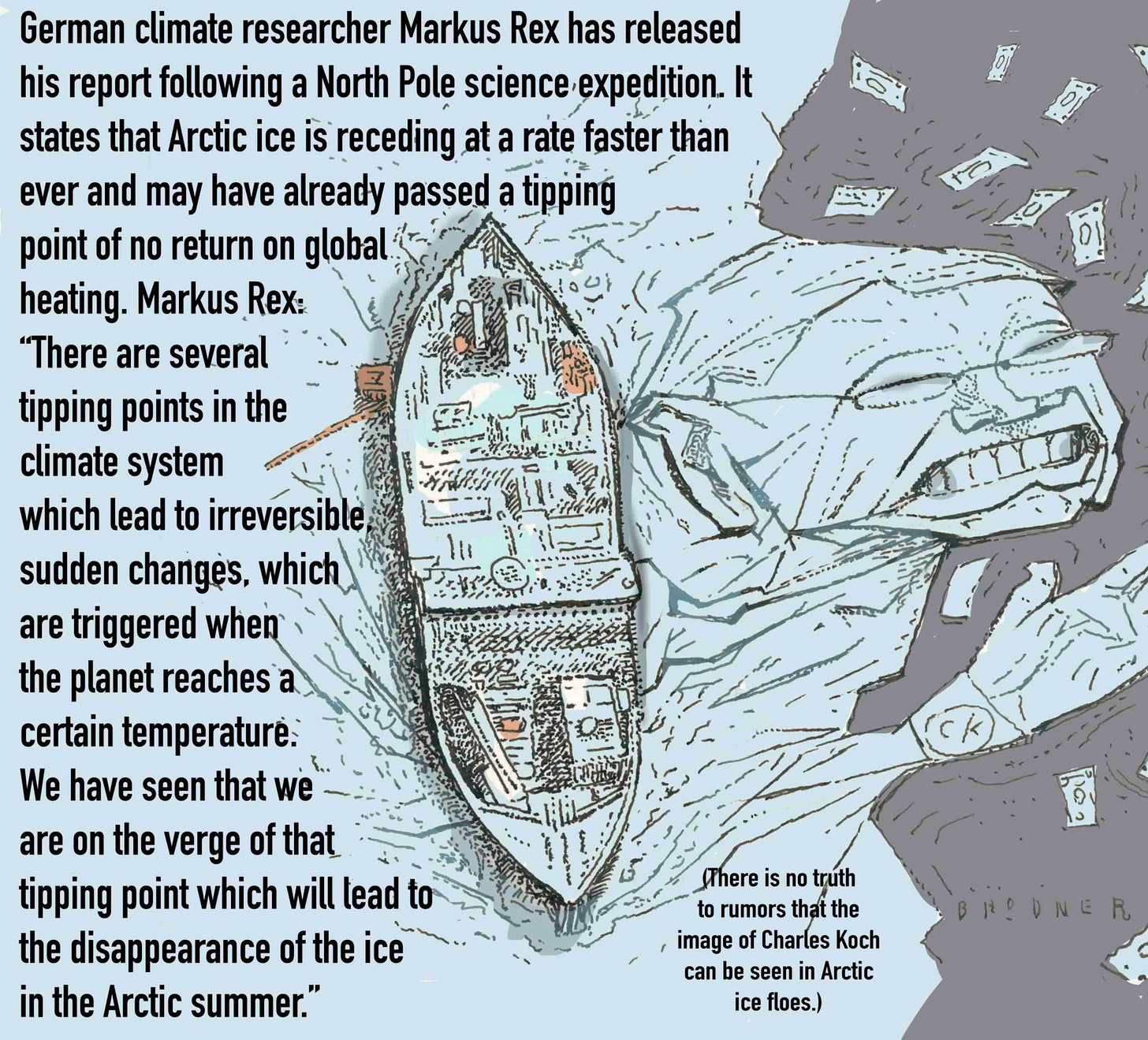My Global Warning on Climate Change--37 Years Ago
When I was prescient at the creation, Plus: a Marvin Gaye bio-pic (at last), more on the Peter Jackson/Beatles flick, and Joan Armatrading up to date.
And away we go, on what has suddenly become a holiday weekend….enjoy, share, comment, and/or subscribe, it’s still free.
The Greenhouse Defect
I've never thought of myself of a pioneer in warning about climate change, but maybe…just a little. Back in 1984, Viking published a book (my second) that I wrote with Pascal J. Imperato, titled Acceptable Risks, which examined how regulators, and individuals, choose to ignore certain hazards--such as pollution, smoking or living in earthquake-prone California--while taking action against others, often in a highly irrational way. The penultimate chapter explored an emerging (but not widely recognized) danger we called "The Ultimate Risk: The Greenhouse Effect."
That is what it was called before it was referred to as "global warming" and then more accurately and broadly, "climate change." Back in the good old days we figured we still had plenty of time to address it. In that period, nuclear threat was the prime concern.
Recently I decided to check back on that chapter, which I penned by myself (in 1982), for the first time in a few years. What I found: There's not much new under the ever-hotter sun. The "inconvenient truth" of global warming has been told for decades--Dr. James Hansen was featured in our chapter--to little avail. In fact, the chapter in Acceptable Risks opens with a warning about the Antarctic ice sheet melting, and a future rising of the sea levels likely to "submerge" coastal cities.
The paragraph that followed: “There have been warming trends before, but never one so rapid as this -- virtually overnight on the geological clock. Rather than having several hundred years to cope with the changes it may bring, humankind will have to adjust in little more than half a century.” Of course, we are now nearly 40 years into that half-century.
"More than a severe disruption of the world economy is at stake," I wrote. "The very survival of Earth's highest forms of life may be on the line." But, I advised, "Something can be done to prevent--or at least mitigate--this threat. On a global basis, humankind can cut down its burning of fossil fuels, stabilizing the excessive accumulation of carbon dioxide in the earth’s atmosphere that creates the hazard known as the Greenhouse Effect.
"There is no sign, however, that we have the slightest interest in doing this."
Back then, scientists felt sure the warming would soon come--they accurately projected a one degree global rise in 20 years--but that normal temperature cycles were probably masking the trend, and "the lack of clear-cut evidence for a major warming effect may have terrible consequences, for it has already undermined efforts at getting governments of the world's nationals to deal with the threat of such an effect."
So what was our own Congress doing about it then? About as much as it is now. But there was sort of an excuse. Climate change, as noted, was still somewhat speculative. One top scientist told me, "To really know anything you’ll have to wait another thirty years, so we won't be able to convince Congress of anything until 2010."
As it turned out, we came to know a lot more, and worse, long before thirty years passed. As Leonard Cohen once put it, "We asked for signs / and signs were sent." And we’re now eleven years past 2010.
Steve Brodner with a news flash, below, just yesterday….
Music
Two articles caught my eye yesterday. One was a major Joe Hagan piece at Vanity Fair on the upcoming Peter Jackson deep-dive into the Beatles’ Let It Be project, based on many, many hours of new film. There’s a lot new in the article, but this caught my eye:
In 1971, says Jackson, an Apple employee who worked in the Savile Row studio stole 140 hours of the audio, which left only a mono version used for the final cut of the film. The stolen tapes contained hours of sound recorded when the cameras weren’t rolling, meaning there was potentially even more revelatory evidence to be unearthed. “They eventually got Interpol involved,” says Jackson. “In the late ’90s or early 2000s, they did a sting operation in Amsterdam and recovered all of the tapes, apart from 40. There was about 560 quarter-inch tapes. There are still 40 missing, but we managed to find some of that sound through other sources.”
And this:
Far from a period of disintegration, says Jackson, “these three weeks are about the most productive and constructive period in the Beatles’ entire career.” The tracks you hear on Let It Be were recorded during this three-week period. The band also rehearsed three-quarters of the Abbey Road album, about half of Harrison’s All Things Must Pass album, a half dozen songs that would later appear on McCartney’s solo albums, and a couple that would show up on Lennon’s. It was, Jackson marvels, “the Beatles doing these.”
Here’s the “sneak peek” offered by Jackson a few months back, if you missed it or want to watch again.
The other piece was by my old Crawdaddy colleague Jon Pareles on a new album by the great Joan Armatrading, one of the most underrated pathfinders and performers of the 1970s and 1980s. Here’s Joan from just a couple years back with an early classic, and still sounding great. What—the GoGos in the Rock Hall of Fame and not Joan????
Film
Warner Bros. has acquired the long-delayed Marvin Gaye biopic What’s Going On, Variety has confirmed. Dr. Dre will produce alongside Jimmy Iovine and Andrew Lazar, with Allen Hughes set to direct. Warners has secured poet-playwright Marcus Gardley to write the script and the rights to use all of Gaye’s signature songs.
Song Pick of the Day
Going out to Joe Biden, Novak Djokovic, Jacob deGrom (and Mel Brooks) today, Tom Petty’s “It’s Good to Be King.”
“Essential daily newsletter.” — Charles P. Pierce, Esquire
“Incisive and enjoyable every day.” — Ron Brownstein, The Atlantic
“Always worth reading.” — Frank Rich, New York magazine, Veep and Succession
Greg Mitchell is the author of a dozen books, including the bestseller The Tunnels (on escapes under the Berlin Wall), the current The Beginning or the End (on MGM’s wild atomic bomb movie), and The Campaign of the Century (on Upton Sinclair’s left-wing race for governor of California), which was recently picked by the Wall St. Journal as one of five greatest books ever about an election. His new film, Atomic Cover-up, just had its world premiere and is drawing extraordinary acclaim. For nearly all of the 1970s he was the #2 editor at the legendary Crawdaddy. Later he served as longtime editor of Editor & Publisher magazine. He recently co-produced a film about Beethoven’s Ninth Symphony.






